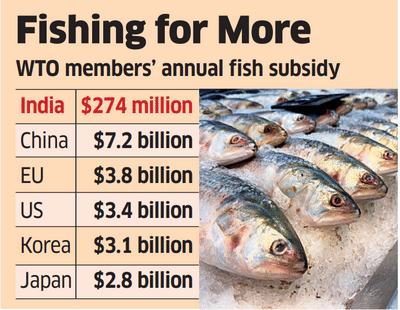New Delhi: Around 50 developing and least developed countries (LDC) including Tunisia, Senegal, Bangladesh and Morocco have aligned with India on measures to curb harmful fisheries subsidies at the World Trade Organization (WTO).
India wants the subsidies to be on a per capita basis instead of the aggregate level of subsidisation and based on the special and differential treatment (S&DT) principle to safeguard the livelihood of its small and artisanal fishers, officials said.
India wants 25 years exemption from any subsidy cuts to protect its poor fishermen while the developed nations insist on a five-seven year transition period.
"The LDC group and other developing nations are in support of our stance on fisheries subsidies. If there are no disciplines and S&DT, then what will we do with a new agreement," said an official, who did not wish to be identified

WTO members are working on Fish 2 or "second wave" to curb subsidies that lead to overfishing and overcapacity.
The support for India's stance comes amid 105 WTO members ratifying the first edition of the agreement on fisheries subsidies which put into place binding rules to curb harmful subsidies. It prohibits subsidies for illegal, unreported and unregulated fishing, for fishing overfished stocks and for fishing on the unregulated high seas.
The first agreement will come into force after it is ratified by 111 members.
In Fish 2, India has insisted on sustainability rather than market access in the guise of sustainability, according to the official.
Flagging the disparity between the high fisheries subsidies of $76,000 per fisher per year given by developed countries and $35 that India gives, the government has said that poorer countries shouldn't be unreasonably burdened and the historically large subsidising countries should not benefit at the cost of developing countries including the LDCs.
India wants the subsidies to be on a per capita basis instead of the aggregate level of subsidisation and based on the special and differential treatment (S&DT) principle to safeguard the livelihood of its small and artisanal fishers, officials said.
India wants 25 years exemption from any subsidy cuts to protect its poor fishermen while the developed nations insist on a five-seven year transition period.
"The LDC group and other developing nations are in support of our stance on fisheries subsidies. If there are no disciplines and S&DT, then what will we do with a new agreement," said an official, who did not wish to be identified
WTO members are working on Fish 2 or "second wave" to curb subsidies that lead to overfishing and overcapacity.
The support for India's stance comes amid 105 WTO members ratifying the first edition of the agreement on fisheries subsidies which put into place binding rules to curb harmful subsidies. It prohibits subsidies for illegal, unreported and unregulated fishing, for fishing overfished stocks and for fishing on the unregulated high seas.
The first agreement will come into force after it is ratified by 111 members.
In Fish 2, India has insisted on sustainability rather than market access in the guise of sustainability, according to the official.
Flagging the disparity between the high fisheries subsidies of $76,000 per fisher per year given by developed countries and $35 that India gives, the government has said that poorer countries shouldn't be unreasonably burdened and the historically large subsidising countries should not benefit at the cost of developing countries including the LDCs.
You may also like

Skincare Routine for the Winter Season

Amber Wings Get DGCA Certification For Hybrid Cargo Drone

Lenskart Adds Smart Glasses To Its Cart: Next Growth Arc Or Risky Bet?

Only the sharpest minds can find 3 errors in tricky football brainteaser

Maharashtra Mulls Law To Mandate Rent Payments For Tenants In Stalled Redevelopment Projects







